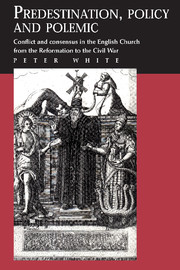 Predestination, Policy and Polemic
Predestination, Policy and Polemic The evolution of royal policy
In January 1616, Sir Dudley Carleton succeeded Winwood as ambassador at The Hague. His sympathies were decidedly with the Contra-Remonstrants, and he chided Oldenbarnevelt for comparing them to the English Puritans. He considered the Arminians to be novelists, favourers of popery, and he blamed them for disturbing the peace of the Dutch Church. Carleton explained to the king that the resolution of 1614 had not settled the dispute, and that both sides were claiming his support, the Remonstrants on the basis of the letter of 6 March 1613, their opponents appealing to his Declaration against Vorstius. Carleton and Winwood (now Secretary of State) set out to resolve the ambiguity in the Contra-Remonstrants’ favour. It was the more urgent, in that (as Carleton conceded) ‘the worst cause had the better men’, and (as Winwood admitted) ‘I cannot deny but that universal grace is a plausible learning to flesh and blood.’ In February 1617, Carleton assured the Dutch that ‘his Majesty is of the opinion, that the Contra-Remonstrants, which profess the ancient and received doctrine acknowledged by an unanime consent of all the reformed churches, should not give place to the factious opinions of Vorstius and Arminius’. At the same time, the king was coming round to the view that the dispute ran so deep that it could be resolved only by a synod, and a letter to that effect was despatched on 20 March.
Royal policy towards the conduct of the synod began to be formulated. The king was firmly opposed to any revision of the existing formularies. The Heidelberg Catechism, to which all the Reformed churches consented, expressed the ancient doctrine.
To save this book to your Kindle, first ensure no-reply@cambridge.org is added to your Approved Personal Document E-mail List under your Personal Document Settings on the Manage Your Content and Devices page of your Amazon account. Then enter the ‘name’ part of your Kindle email address below. Find out more about saving to your Kindle.
Note you can select to save to either the @free.kindle.com or @kindle.com variations. ‘@free.kindle.com’ emails are free but can only be saved to your device when it is connected to wi-fi. ‘@kindle.com’ emails can be delivered even when you are not connected to wi-fi, but note that service fees apply.
Find out more about the Kindle Personal Document Service.
To save content items to your account, please confirm that you agree to abide by our usage policies. If this is the first time you use this feature, you will be asked to authorise Cambridge Core to connect with your account. Find out more about saving content to Dropbox.
To save content items to your account, please confirm that you agree to abide by our usage policies. If this is the first time you use this feature, you will be asked to authorise Cambridge Core to connect with your account. Find out more about saving content to Google Drive.